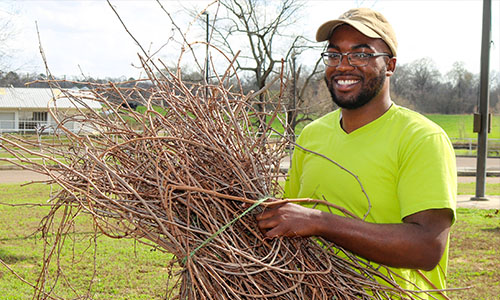Alcorn’s Center for Conservation Research distributes over 10,000 cuttings of muscadine grape vines to farmers
On Tuesday, Feb. 20 and Thursday, Feb. 22, the Alcorn State University Center for Conservation Research distributed over 10,000 vine cuttings of two of the most highly-adapted varieties of muscadine grapes—Dixie and Summit. Additionally, a training was conducted for all in attendance on clonal propagation and nursery establishment. Each participant was given 100 cuttings of grape vines.
The distribution and training were hosted by Dr. Girish K. S. Panicker, director for the Center for Conservation Research. Panicker explained that muscadine grapes are native to Mississippi and have become the highest income-generating fruit crop in the southwest region of the state. Additionally, many major value-added products can be produced from muscadines, including wine, jelly, juice and fresh fruit.
Muscadines have many health benefits as well. According to Panicker, “Muscadine seeds and skins contain higher levels of total antioxidants than any other fruit or vegetable. These antioxidants can prevent tumor formation in the breast and cervix.”
Because of the benefits, the Center seeks to equip and inspire novice farmers to establish their own muscadine nurseries.
“Today, farmers were supplied with organic grape cuttings from the muscadine mother plant,” Panicker said. “These can be harvested and maintained in their backyards and gardens. In June, we will host another workshop about the clonal propagation of muscadines, where farmers are welcomed back to receive detailed training in air layering—a key method in the propagation process in which a large-sized plant is produced in a short period of time.”
The Center’s field technician and farm manager, Willie Mims, conducted an in-field demonstration on the cultivation of muscadine nurseries. During the demonstration, he detailed the basic anatomy of the vines. He also stressed the importance of sustainable and easy farming practices to produce high-quality fruit.
“Muscadine production requires proper training of the roots and vines,” Mims said. “Proper training of newly set vines is extremely important, because if vines receive proper care, they will bare plenty of fruit.”
For more information on muscadines or the Center for Conservation Research, contact Panicker at (601) 877-6598 or [email protected]. For more information on the School of Agriculture and Applied Sciences, visit www.alcorn.edu/land-grant.




